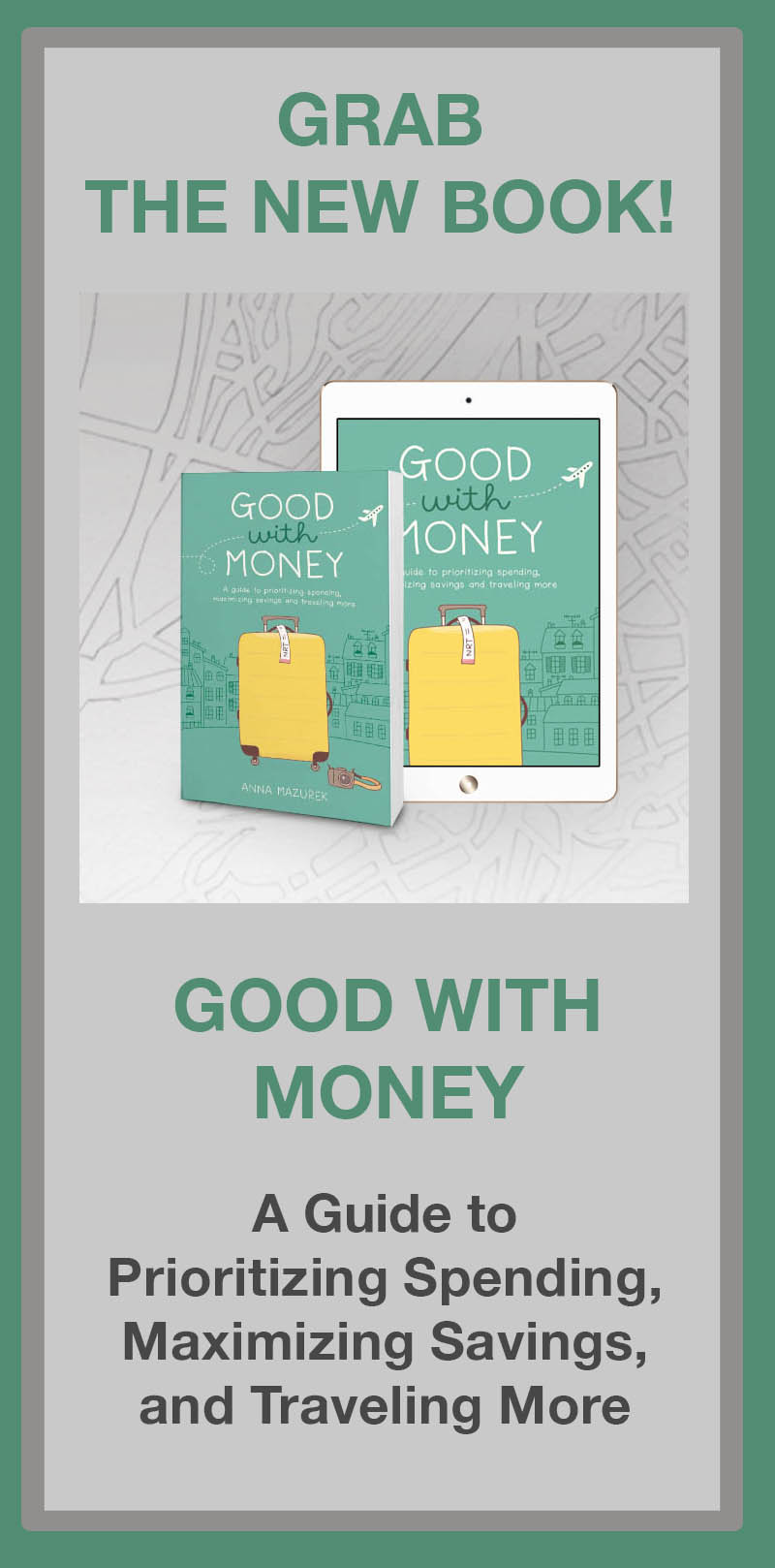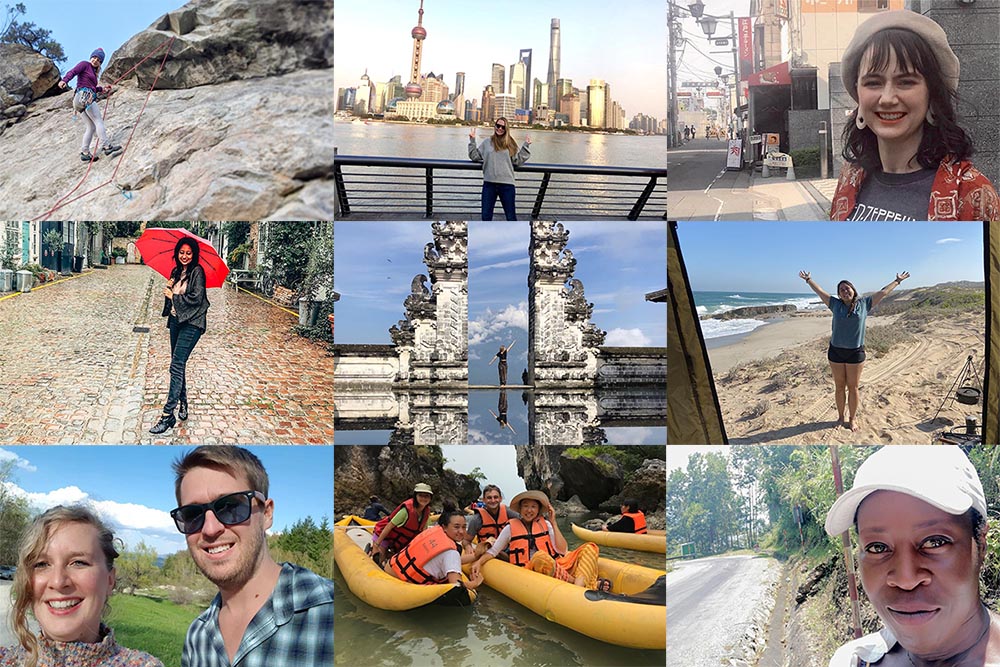
I asked nine expats, digital nomads and full-time travelers about their experience during the last few months of the ongoing pandemic. I was curious about how each country was handling it and what it was like to be a foreigner abroad during this crazy time. From Argentina to Australia, here are their detailed stories of quarantine, lockdown, losing a parent to COVID, evacuation flights, writing books in the down time and trying to return to some form of normalcy.
Shanghai, China:
Traveling to Renew a Work Visa & QR Code Contact Tracing
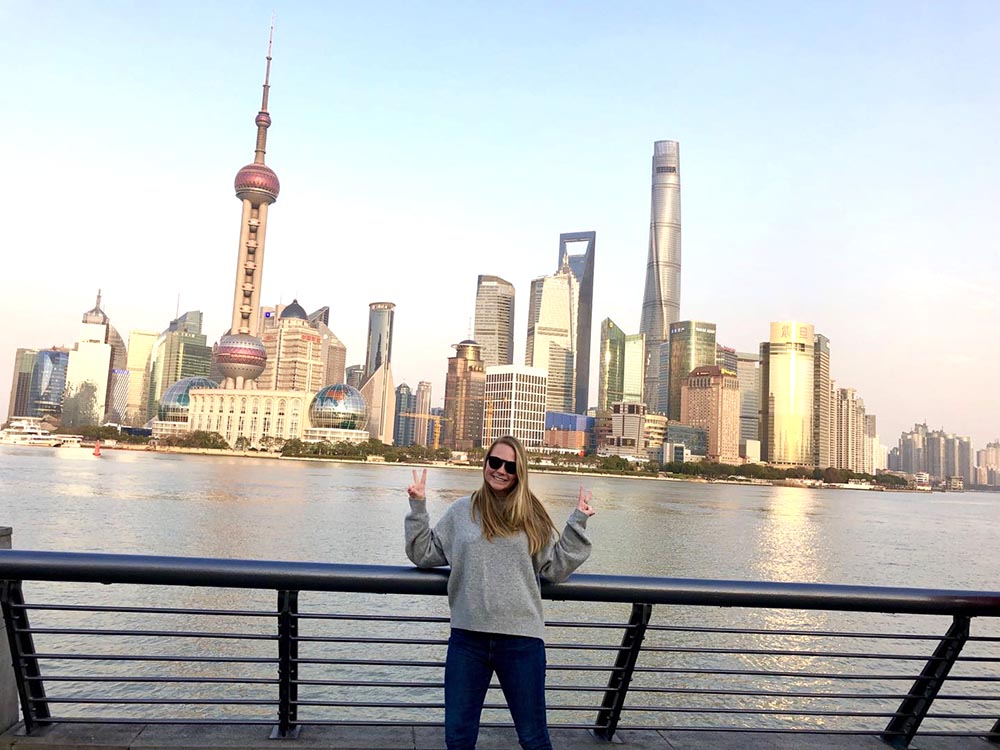
Name: Jessica Dumas
Nationality: USA
Current Location: Shanghai, China
Instagram: @Jess_dumas
I first heard about the virus right before Lunar New Year via some mumbles and grumbles in the English news sources I subscribe to here in China. It wasn’t anything too alarming, but I was rather glad to be headed to the Philippines for the holiday. Lunar New year is one of the busiest times for travel in China, with millions of people crisscrossing the country to be with family, so I grabbed some masks and hand sanitizer for my flight and headed out for some rest and relaxation. Unfortunately, within only a few days, talk of COVID was everywhere. Family and friends back at home were reaching out to see where I was, and I was alternating between snorkeling and checking BBC on the beach. The concern on the islands I visited (El Nido and Boracay) was low. There were some tourists fashioning their beach wraps with masks but no restrictions at any hotels or businesses. Face masks are extremely common in China and most Asian countries I have visited. It is normal to wear a mask year-round if the AQI [air quality] is too high due to pollution (to protect yourself); if you are under the weather (to protect those around you), and even during regular train and plane travel (because, germs).
After a week in the Philippines, the cases were rising more quickly, and I reached out to friends who had been based in Shanghai for over five years to get some guidance as to what their plans were. They were on their way to the airport, cutting their trip in Cambodia short to fly to Shanghai, get essentials and fly immediately back out of China to the U.K. and U.S. Most companies in Shanghai closed or switched to remote working, so with realizing I could work anywhere, I forfeited my flight back to Shanghai and flew straight back to Boston a few days later. I spent about three weeks in the U.S., where there were not many cases other than from the docked cruise ships. Toilet paper was still abundantly available. Life was great. But, then I received word from my company that my visa was set to expire, and if I wasn’t in the country by the day before, I would have to start the whole process over again and potentially face large delays in the processing. As cases in Shanghai remained low and friends who had hunkered down said it was essentially just quiet around the city, I headed back to China with many hazmat-suit clad flight companions, entering about 24 hours before my visa was up.
I did not fly in a hazmat suit just in a mask but a ton of others on my flight were in full suits with goggles and their Vietnamese rice hats or beach hats on top! Haha! I connected through Bangkok so lots of island goers were heading back to Shanghai from there. We also sat on the plane for almost three hours once landing [in Shanghai] so hazmat-suit wearing authorities could call off people they deemed to be at risk of being infected with the virus. They tested only about 20 people from my flight and then let us go through a bunch of temperature checks and everything in the airport. We got stickers assigned to our passports and mine was green so I went straight through and took a taxi home. Others were quarantined in a government hotel. It depended where you flew from and if anyone on your flight tested positive.
About a week later, while completing my 14 day required apartment quarantine, foreigners were restricted from flying into China. A week or so after that, as I emerged back into life outside my apartment, life appeared to be getting back to normal. Deliveries were no longer left on labeled shelves at the gate of my complex but brought directly to my door. Masks were at first required 100% of the time outside your home but were eventually reduced to only inside establishments, public transport and taxis though most people are still wearing them all the time. This new normal also included an ear or wrist temperature check, signing in your name/passport/phone number and showing your personalized color-coded QR code. (Green being the only color accepted, representing that you have not traveled to any at risk regions or been exposed to any people who have been confirmed to have the virus.) Everyone [in China] has an individual code that is constantly being updated. You can’t take a screenshot in the morning and use it all day, you must show the code active in the app. Here in China, we pay for everything with QR codes and one of the services called Alipay has this health code feature. It tracks you (I assume by location and spending) and will be green if you have not been exposed to anyone that has reported being positive. If you have traveled to a location that reports new cases your code may turn yellow or red. You wouldn’t be able to do very much without a green code a few months ago. Now it is more relaxed and only necessary at large gatherings, some restaurants, hospitals, etc. in Shanghai. If I were to travel in China to any other city, I would need to register and get a QR code for that city. It is mandatory.
This has, as of now in July, been reduced to just the Green QR health code and occasional temperature checks, but I am happy to do those things if it means I get to eat mapo tofu with friends. My experience is, of course, not reflective of everyone who has stayed in China for the duration of the last six months. I feel extremely safe and grateful to my community and the city for taking it so seriously. Just this morning, the property manager delivered masks to me and everyone in our complex. #wearamask
Future Travel Plans:
In regards to travel for the rest of this year, I think this is my year of China travel. Unfortunately, my company has advised us not to leave the city for a few weeks due to the most recent cluster of cases in Beijing, but I hope in a couple of months to be able to check some amazing mainland China sights off my bucket list – Xi’an, Zhanjiajie, Yangshuo, Yunnan province and more!
El Bolson, Argentina:
Living off the Land in Patagonia
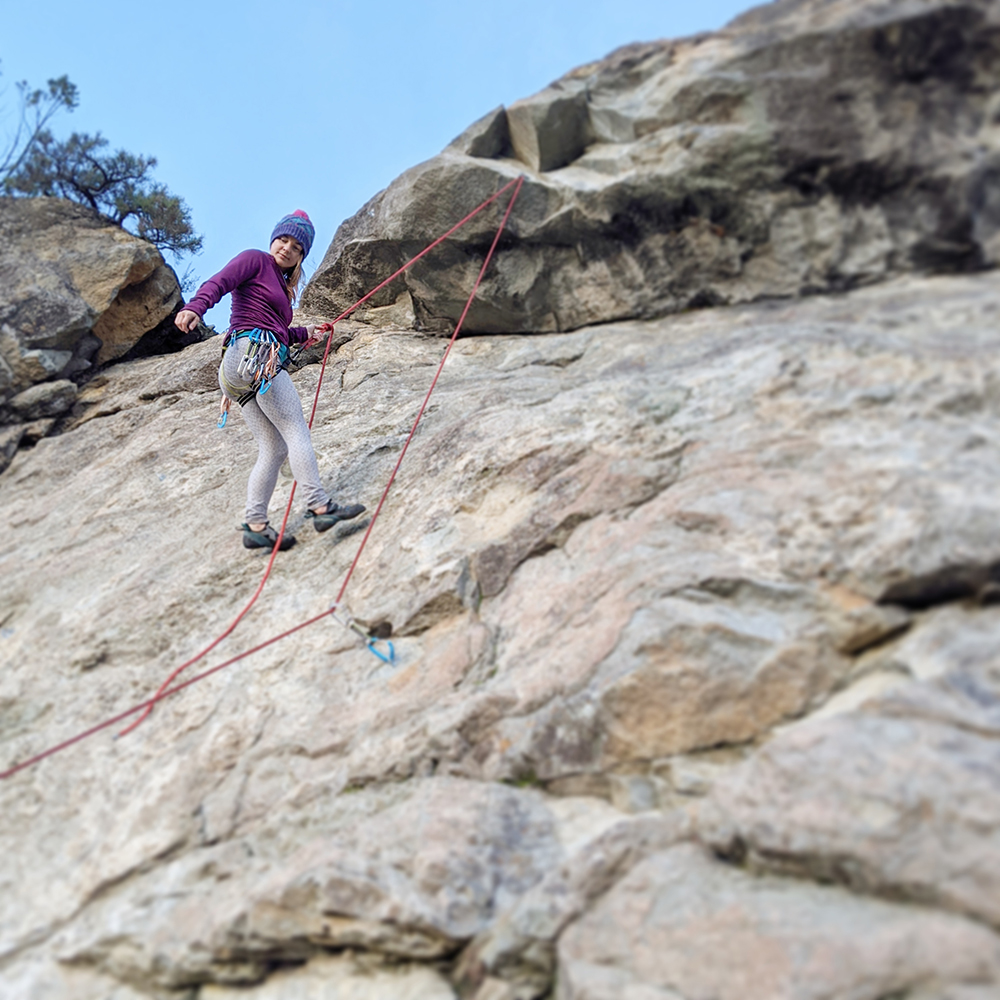
Name: Jodie Mohrhardt
Nationality: American
Current Location: El Bolson, Argentina
Website/Social media: @Jodiemohrhardt & thefoxandthetoad.com
[Jodie took a one-year sabbatical from her teaching job as a Visual Arts Teacher at the Boulder Valley School District in Colorado for an around the world trip and is flying back to start working again in August.]
Quarantine for me was most likely very different than for others around the globe. I was stuck in a little town [in Argentina] called El Bolson, it’s right at the start of Patagonia nestled in the Andes Mountains. I came here for a yoga retreat, and I was planning on making my way back north with my partner to Ecuador where we would meet some friends for the end of my year around the globe. Sadly, three days after arriving in El Bolson and only six days after being in the country, we were told we were not allowed to leave the hostel, not even for a walk around the block!
It was first for two weeks, then four, then six and soon became nine weeks of quarantine. Eventually after a little over eight weeks, we were allowed to go out for walks two days a week for an hour. After the first four weeks though, myself and my partner, as well as a German guy were the only ones left other than the volunteers at the hostel. For me, it was warm and beautiful and at the base of Mt. Piltriquitron, and I still had five months off [work], I wasn’t about to go home yet where things were going downhill fast with COVID.
I enjoyed my time because I was with amazing people in an amazing place. What better place to be stuck in a situation like this than at an Earthship [eco-friendly accomdation] who’s main goal is to live as much off the land and as earth-friendly as possible? We decided to make our stay there more of a communal living situation than guests and workers. We were able to stay for a very reduced rate and share some of the tasks of taking care of the place and cooking as a group for our meals. I became vegan (okay not really, I ate amazingly fresh cheese!). I started making amazing nutritional and earth-friendly foods from our garden. We cooked together, and I made bread, granola, oat milk, kombucha, kefir and many other things. I learned about bio-construction, permaculture farming, dry toilets and composting. I got my hands dirty every day building, making art or digging in the garden. And, I started speaking a new language. I also got to spend so much time working on my personal art, learning to knit and making art from nature. Earthship Patagonia has given me so much and has really changed my thinking on a lot of things in life. It’s also validated a lot of things that made me feel different from others.
I am fortunate that this experience was given to me and I am fortunate that I don’t have to many negative things to list off. I didn’t leave the land of the hostel for 31 days which was tough. I also didn’t get the travel experience that I wanted making my way up to Ecuador. I got to see the mountains but didn’t get to be in them for months since we weren’t even allowed to walk on the streets for the first two months. I also didn’t get to travel south to Piedra Parada where there was amazing climbing waiting for me or Fitz Roy and El Chaltén. But, I wasn’t stuck in a tiny apartment or home endless hours with kids that were driving me nuts. I was learning and growing and making the best out of everything!
Things are finally opening up and I’ve gotten some incredible winter hiking in and seen some of the most beautiful places of El Bolson. I did finally buy a ticket back to the United States for July 25th. It’s been a struggle trying to get home and extremely expensive, too! Argentina has closed off all domestic and international transportation until September so getting a ticket on a repatriation flight was tough. Next step is figuring out how to get to Buenos Aires, which is 25 hours away with no buses or flights and a whole lot of restrictions along the way. This, too, will work its way out.
Future Travel Plans:
Sadly, this is the end for now. I am headed home on the 25th of July back to hot weather [in Colorado], long days and work. I’m sad to be leaving but I also know I am far from being done with Patagonia. I have a piece of my heart here now and I know I’ll be back. I also found an amazing tribe of people down here that I can’t wait to reunite with. But now I am feeling excited to spend two weeks of quarantining in my home (van life), a visit to see my family and then back to work teaching the amazing kids I have in class all the incredible things there are to know about the world.
Bansko, Bulgaria:
Evacuation Flights & Losing a Parent to COVID
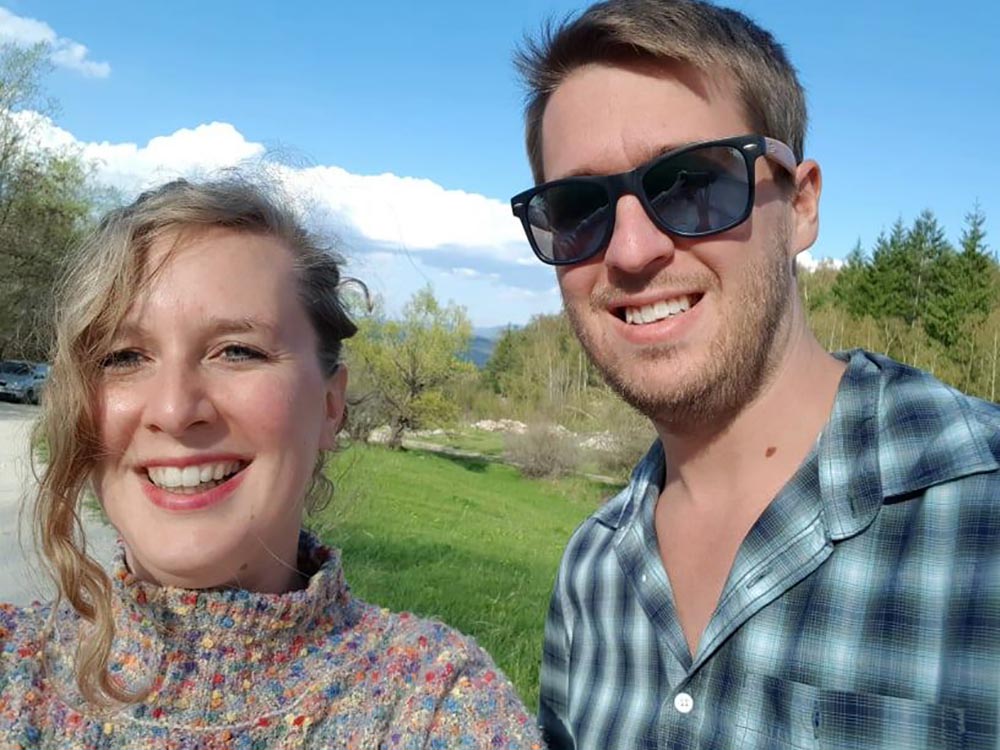
Name: Camille Poiré
Nationality: French
Current Location: Bansko, Bulgaria
Websites: ForTravelista and Camille in Wonderlands
Instagram: @CamWonderlands
It’s been a real rollercoaster for my boyfriend, Bauke, and I since the pandemic started. We spent February on the island of Koh Lanta, Thailand, living in somewhat of a bubble: coworking and hanging out with friends, enjoying the island life. It was business (or nomad life!) as usual. We didn’t realize what was coming.
In early March, we went on a four-day liveaboard scuba-diving trip in the Similan Islands. We had an amazing time hanging out with manta rays and whale sharks, cut off from the news and blissfully unaware of how serious the global situation was getting.
When we reached land again, everything had changed: we found out we might not be able to enter Vietnam as planned. We debated whether to give it a shot anyway and carry on with our travel plans. (At that time, we had a string of nine flights and trains through six countries booked!)
Unsure, we boarded our flight to Bangkok on our way to Vietnam…only to bail in Bangkok and decide to go back to Koh Lanta! However, the relief we felt when we reached the island didn’t last. We couldn’t stay in Thailand much longer, as we only had a few days of validity left on our visa. We tried to come up with ways to extend it, but every time we found a potential solution, it quickly vanished as neighboring countries closed their borders one by one.
Eventually, we came to the conclusion that our only option was to retreat to our “new home” in Bulgaria. After being “homeless” for eight years, we had just bought an apartment in a mountain resort called Bansko and become Bulgarian residents last July! Talk about timing!
Happily, we also found out that we could activate our travel insurance’s political evacuation clause and get flown to Bulgaria at their expense – yay! Except…the moment we received our flight booking confirmations, we also learned that Bansko was being placed under full quarantine for at least two weeks! It was too late to change our plans again, so we decided to book an Airbnb in the Bulgarian capital, Sofia, and wait out the Bansko lockdown and our quarantine there.
Two weeks later, on April 4th, we finally reached our Bulgarian home and breathed a HUGE sigh of relief! After all these stressful ups and downs, it has felt incredible to be back here and it has made us SO appreciate our beautiful, spacious apartment in the mountains.
Heartbreakingly though, the lowest low of our corona journey was still to come. In late May, my biggest virus-related fear came true: my dad passed away from COVID-19, shortly after turning 63. Sadly, after being extremely careful for months, he caught it at the hospital where he was receiving treatment for his cancer. The virus robbed my sister and I of a chance to say goodbye. If all had gone well, we would have been celebrating my dad’s birthday with him in France in early May.
To complicate things, my mum had also caught the virus from visiting him. We found ourselves in the surreal situation of mourning my dad while also fearing for my mum’s life (she is now out of danger – phew!). Bauke and I traveled to France for the funeral. Our first week there, we could not even approach or touch my grieving mother to avoid contagion. The funeral was also delayed by two weeks and had to be limited to 20 people. It’s been a very weird, trying time.
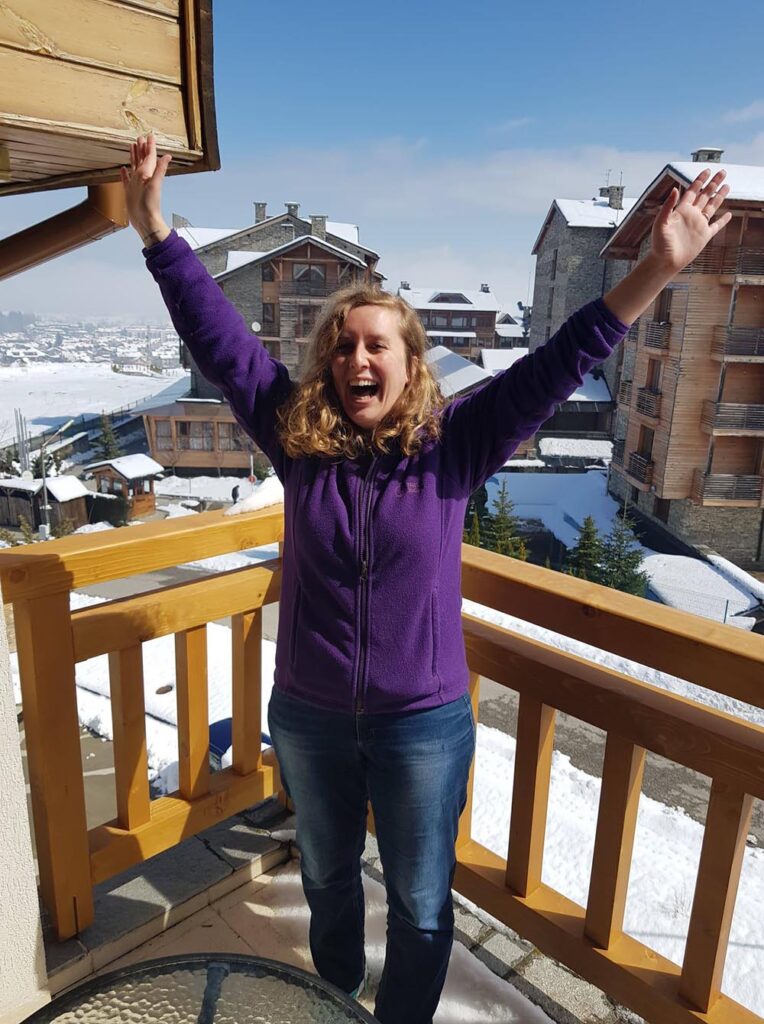
Future Travel Plans:
At the moment, we’re making the most of the summer in Bansko. There is a fantastic community here and things to do literally every day: BBQs with friends, hiking, mountain biking, hot springs, rafting, outdoor movie nights etc. We’ve also started taking a few short trips within Bulgaria and will continue to explore the country, and perhaps venture into neighboring ones. We’ve just been to the Bulgarian Black Sea coast and the historical town of Plovdiv, and we’re considering a getaway to Greece and/or Serbia next.
If all goes well, we’re also hoping to spend August in France to be near my mother and the rest of my family. We’ll mostly cat sit for family friends in my hometown near Paris, before going to the coastal village where I’ve spent most of my childhood summers in Bretagne.
Since intercontinental travel still seems uncertain, we’re thinking of staying in Europe for the rest of 2020. It looks like we’ll have to forget about Southeast Asia this fall so we’re eyeing a warm European destination instead. The Canary Islands and the south of Spain are currently top contenders for October-December!
We’d already decided to experience a full ski season in Bansko next year, so corona won’t change our plans for January-April 2021: we’ll be enjoying the snow, Bulgarian mulled wine and our fireplace!
Da Nang, Vietnam:
The Best Place to be Locked Down
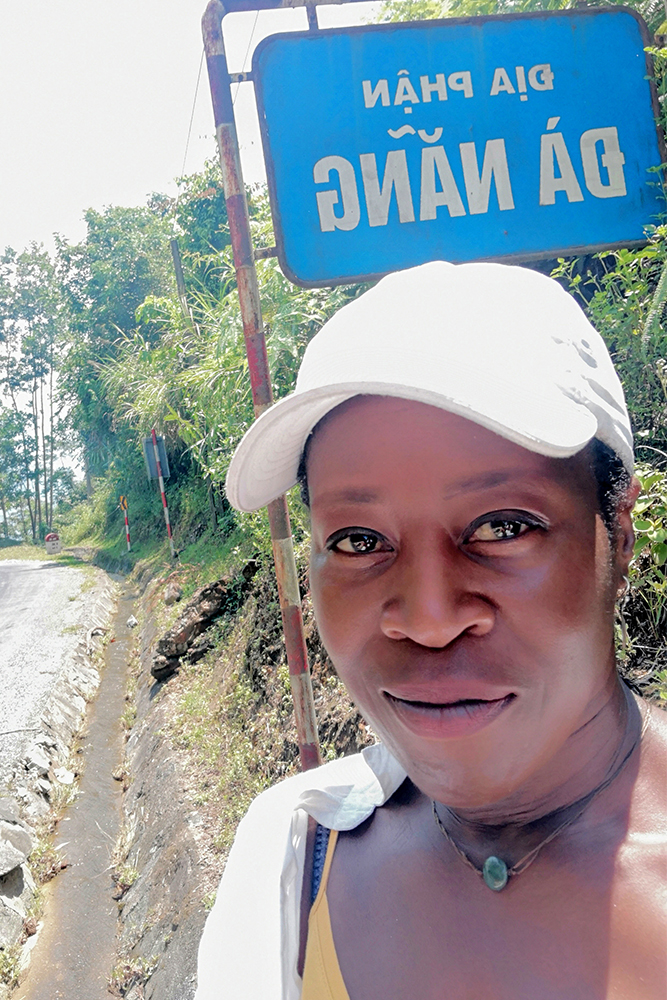
Name: Marilyn Solomon
Nationality: British (Oxford, England)
Current Location: Da Nang, Vietnam
Instagram: marilyn_in_vietnam
The Good:
Gratefully, my apartment came with a rooftop terrace from where I set up set up my laptop, did yoga and took occasional afternoon naps, too! This was my new life; BUT the best bit, lockdown only lasted three weeks here! Some might say it was four weeks, others five because of its gradual re-opening, it depended on what you were missing I suppose.
One good change due to lockdown, I shopped very locally in an open-air fruit and meat markets. I use to find this slightly intimidating; understandably they do not speak English, why should they? Becoming a regular eased things and was a big step into immersing myself into my new community.
For the first time since I started travelling, I formed a strict routine. My freelance work was scheduled in and a workout sandwiched with long walks. I began recognising local individuals, and they, me. Sounds odd but with so few Westerners around, I expect it was unusually for them to see any of us remaining with the borders being closed, and then to see the same face long enough to recognise us. Some locals will tirelessly greet me every morning with board smiles and, the only word they may know in English, “Hello!” Their enthusiasm never waned. And no, many were not wearing the mandated mask.
The Bad:
The lockdown rules that restricted us directly were: stay local, social distancing, no groups of more than two and always wear a mask outside of the home. Apart from the two other guests in my apartment block, Americans, I rarely saw another non-Vietnamese face. For the initial first week after lockdown we still had to wear masks, be subjected to temperature checks on entry to shopping malls and our lovely sandy beach was still taped off. Many of us travellers witnessed a heart-breaking change at the very beginning of the outbreak. The faces of this once welcoming and smiling community turned to utter fear when they saw us ‘obvious foreigners.’ I totally understood. Foreigners brought the deadly virus into their country, foreigner equated to carrier of the deadly virus to them. I just respected their feelings and kept a wider berth. It was one of the reasons I stayed very local; everyone knew me and that I was not a newcomer into their country.
The Crazy:
The craziest thing is the visa situation. We still need one and are fined for each day it lapses despite all borders being closed! No flights in or out yet they haven’t waived the necessity for valid visas. Unlike other countries such as Thailand, I’m asked to pay three times the expected rate.
At the point of lockdown, the number of cases was only in the 20s or 30s, even today the total number of cases are only around 350 and zero deaths. Only a few of these affected people were found in the community, all infected and suspected cases (inbound travelers) were held in government-managed quarantine centres or hospitals. Despite this lockdown applied to the whole of the country and was extended from a second to a third week, during which there were only about four new cases found amongst its 96 million population.
Seeing Da Nang quiet during lockdown was so surreal. It was never on complete lockdown, people on the streets and their scooters were everywhere, just less so. It was the many restaurants and huge hotels that closed, many remain closed today with no tourists from China and South Korea (the source of a majority of their tourism) being let in.
Future Travel Plans:
All the borders are still closed to tourism with no word on when this might change so I’ve little choice but to remain in Vietnam for the foreseeable. Future travel plans are a big topic, much discussed amongst travellers here. My planned travel locations are all still tackling the virus so it’s not so much where I’ll travel to, it’s more about whether. That’s why, for now, I’ve decided to hang up my travelling boots and stay. I saw and felt the anxiety of the local Vietnamese community about our presence, but, not forgetting, we are the direct result of the country’s need or pursuit of the foreign tourist industry. I feel it will be a while before the world is ready for “non-essential travelling” – that includes us nomad travellers.
Should the opportunity arose to return home to the U.K.? It’s not coping terribly well! I will never feel relaxed about visiting any other country where I am not happy to be in lockdown indefinitely.
I think we’re in one of the best, if not the best, places in the world for a pandemic outbreak. It’s a country that I happen to love too… there is just no better place to be stuck in for me. I have total respect for their strong, stringent governance of the virus and of their committed community. Thank you, Vietnam!
Singapore:
A family of New Yorkers moves abroad as the pandemic hits

Name: The Kimelia Family (Jeanhee, Luke, Chiara and Jemma)
Nationality: USA (New York City)
Current Location: Singapore
Instagram: @Kimelias.Eat
We have had extremely fortunate timing. We, all lifelong New Yorkers, uprooted ourselves from New York City in August 2019 and made our way to SE Asia to see this part of the world. Until then, our children had never been outside of the U.S. except for the Toronto area! Luke and I had been travelers in our 20s but had settled down after having kids, who are now age 14 and 12.
So, we arrived in Bali in August, and Luke, a digital nomad, worked at coworking spaces throughout our travels so we would spend at least one week in a location before packing our backpacks and hitting the road again. A month in Bali, eight weeks in Thailand (including Koh Phangan, Koh Tao, Phuket, Chiang Mai, Bangkok), two weeks in Vietnam (Ho Chi Minh, DaNang and Hoi An) and a short visit to Angkor Wat with family visiting from the States. Then at Christmas, we headed to Singapore to live, where we found schools for our kids, an apartment, and settled into a routine. I started a job search.
The coronavirus arrived roughly the same time we did in Singapore, but we didn’t know for a few weeks. One of the first cases in the country was in our new apartment building! That prompted a visit to our door from Singapore’s senior minister, who represented our neighborhood and also was the minister of national security! He knocked on every door in the building, brought us masks and asked how we were feeling and wanted us to know that the government was taking the health threat seriously. That’s when we really knew we weren’t in Kansas anymore, Dorothy! It would be as if the deputy mayor of NYC came to our door to reassure us because one of our neighbors had the virus. It has been quite an interesting experience to see a very paternalistic government take charge during a pandemic. Every resident has been provided free masks—at first, a few disposables, then as their importance in preventing contagion became clear, twice, we received free reusable cloth masks—then rules were imposed that required wearing masks any time we left our home except for strenuous exercise. Every resident also got a free half-liter of eco-friendly hand sanitizer: We brought a clean, empty bottle to our neighborhood community center and they filled it with a special formula for COVID-19!
Given that we had traveled with backpacks and eaten out nearly every meal for five months straight, our lockdown, when it came around on April 7th, was tolerable. We were able to finally sit still! And we weren’t itching to travel. That said, our teen had more trouble adjusting. She said she had finally started to have a social life when she was forced to be a shut-in. The weeks before lockdown were hardest because we were trying to be smart and safe, which meant saying no to her gatherings with large groups of friends, and sleepovers. But she adjusted, as we all did, and we even bought Scrabble and some board games before lockdown to give us something to do together some evenings. Zoom and WhatsApp groups have been our lifeline. We have both local friends as well as family and friends back home whom we touch base with regularly. We had a local WhatsApp group that exercised virtually together through plank and other workout challenges and some live Zoom sessions. Our younger daughter has monthly Netflix simultaneous movie and chat sessions with about 18 friends from her old elementary school. She wakes up at 8 a.m. for these movie parties and we set up all the apps for the whole group from here in Singapore!
[The lockdown in Singapore lasted from April 7th to July 2nd. A phased reopening started June 1st and on July 2nd, restaurants, bars, pools and gyms opened.]
Now that we are phasing into reopening, we downloaded an app on our phones and have to check in and out of every single business we visit so that contact tracing can be done if there are positive cases. It’s quite something to see how diligently the people respond to the rules and have a “for the greater good” kind of attitude. We are right now in the beginning of the third week of reopening. So mostly we’ve been going to the beach and have eaten out a couple times but we are not allowed yet to socialize in groups larger than five people. We look forward to having a dinner party soon!
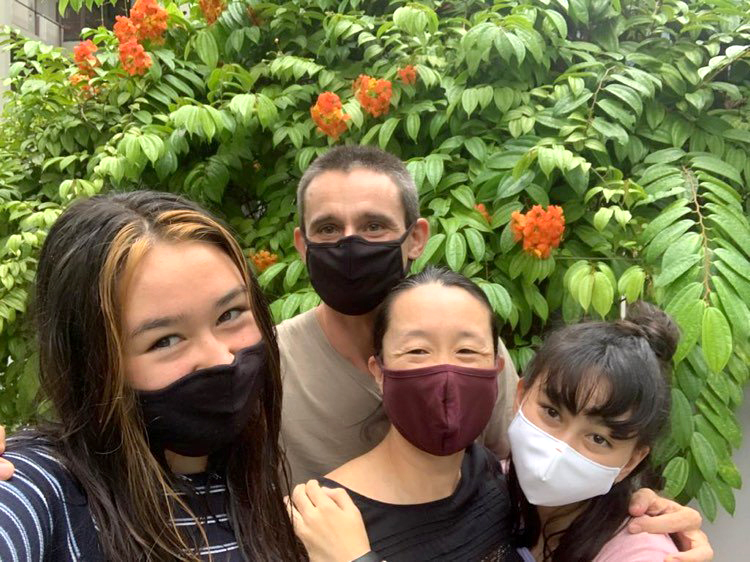
Future Travel Plans:
Sadly, we have no plans for the rest of the year. The two weddings we were planning to attend, in California in August and Australia in January 2021 have been postponed until at least June 2021. We are not sure we would be allowed back to Singapore if we left since we don’t have citizenship so we aren’t planning yet to travel. When we get the travel bug again, which I suspect will be soon, I think we’ll start first with exploring Singapore as tourists. We haven’t been to the Botanic Gardens, the museums, the landmarks or tourist traps yet! We want to see as much of SE Asia and the rest of Asia as we can before we move back to the U.S.
Western Australia:
Sheering Sheep & Road Tripping the Remote North
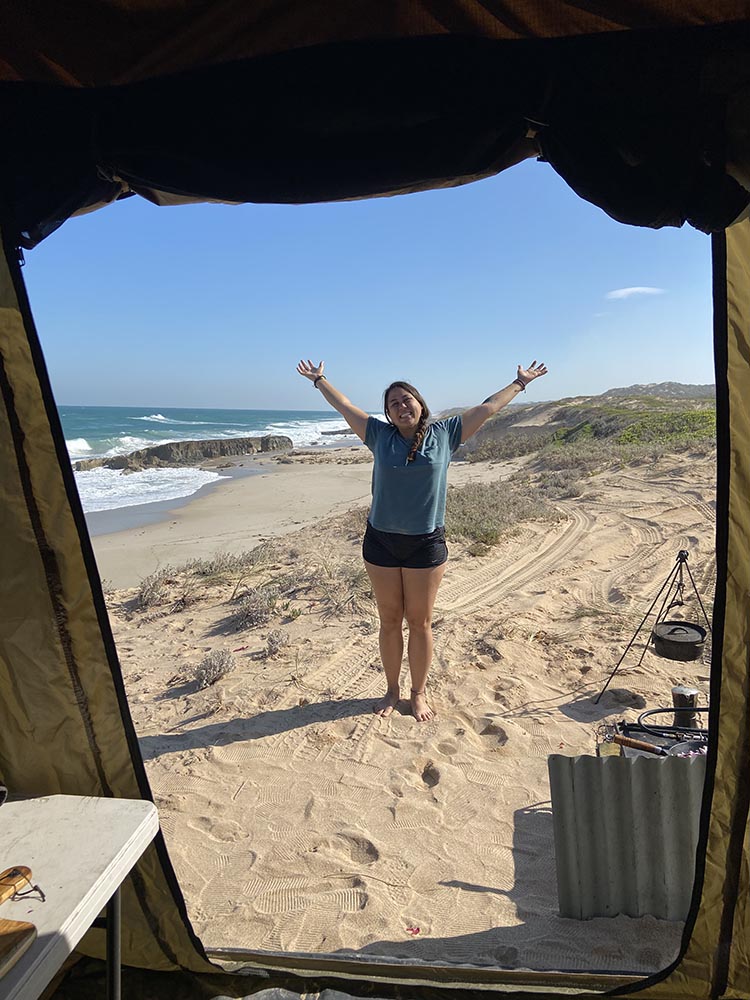
Name: Nina Mariana Pascha
Nationality: Netherlands and Thailand
Current Location: Western Australia
Instagram: Nina.m.pascha
When the news of COVID-19 came out I was working two hours north of Perth, Australia. I came here last year on a Working Holiday Visa and got a job in the sheep shearing sheds as a rousey (wool handler). After going home to Thailand for Christmas, I returned to Western Australia mid-January to do another season (three months) of work.
Australia quickly went into lockdown from the rest of the world. Even within Australia, all the states closed their borders with additional regional lockdowns within Western Australia. Work in the sheering sheds continued as normal and created a bubble from the chaos of COVID-19. People starting asking me if I would return home due to COVID-19 and by the time I looked into flights, it was too late. Prices skyrocketed and flights were being cancelled so I had no choice but to buckle down and make money while I could. There was a fear that all sheering shed work would stop (like they did in New Zealand), so the sheering contractor tried to get as much work for us while they could.
Western Australia eventually opened up its regional borders and allowed camping within the state. Once my work finished up in early May, I set off on my [previously planned] road trip up [heading east along the remote northern coastline of Australia.] Even though camping was permitted, there was still fear of the virus so many campsites didn’t open up. In Geraldton, we were told by rangers to leave the free campsite even though we were abiding by social distancing rules.
However within a few weeks, there had been a huge influx of domestic tourists traveling up to the north. Everyone was trying to escape the cold weather down south for the warmer temperatures of the Kimberly region. National park campsites opened and caravans swarmed in.
The remoteness of Western Australia has had its benefits as life feels normal here. The government’s quick response has helped flatten the curve and there hasn’t been any cases in weeks. The only new cases have come from Australians coming back home or livestock ships coming from abroad. No one wears face masks and social distancing isn’t much of a concern. That’s the crazy thing, as I hear stories from everywhere around the world of life changing, everything here is sheltered.
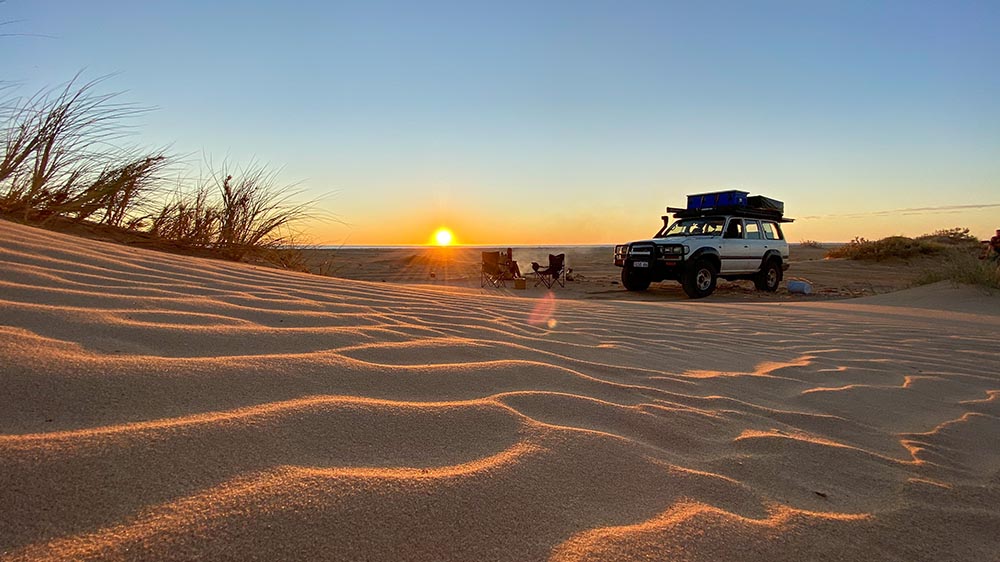
Future Travel Plans:
With the low cases in Australia, the state borders are starting to open up and I will soon be able to travel through to the Northern Territory. My current plans are to slowly make my way to Queensland. Currently I’m traveling with Mitch, an Australian who’s showing me the true Aussie life (@auzzielife2pointzero). We are spending our days visiting national parks, fishing and meeting fellow travelers. Recently, I got my second year Working Holiday Visa approved, and I’ll most likely have to do some work along the way. Hoping to work in Darwin and perhaps at an outback sheep station camp out in Queensland. I’ve also got contacts in Queensland that can help me find further work and a base in case there were to be a second wave. I would love to see more of the East Coast, but there are still clusters of COVID-19 in Eastern Australia, so I’ll have to see how that develops. It’s hard to say what will happen in the future so for now I’m trying to experience as much as I can.
[I interviewed Nina previously about her cycling trip across New Zealand!]
Tokyo, Japan:
Publishing a Book During the Pandemic
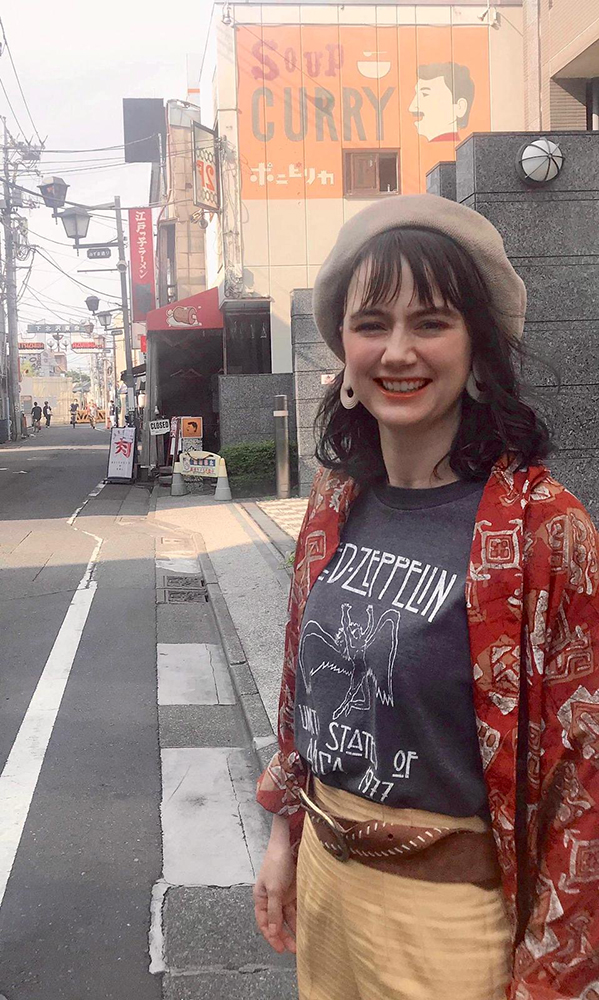
Name: Becky Gillespie
Nationality: American
Current Location: Tokyo, Japan
Instagram: @tokyobecky; Travel Podcast: theschooloftravels.com
I was in Tokyo when all of this started on a six week trip—a one-week business trip in Tokyo and then, one month living in Kyoto for the first time. I got to do both but when I came back from Kyoto on March 16, borders were starting to shut. I was originally scheduled to leave for Cape Town, South Africa to spend a month there and go to Africa Burn, the largest Burning Man event in Africa, but everything got cancelled. I decided that the best place to stay was Japan since I had permanent residency here and it would be cheaper to be on Japan’s medical [insurance] plan if I needed it with my permanent residency status than paying for medical care in the U.S. because I have been nomadic since 2017.
Since I lived in Japan for 12 years, I know how everything works and have friends here. It’s truly like a second home. When I first came back from Kyoto, I stayed with friends for about five weeks, but as the pandemic continued and the borders stayed shut, I moved into a share house with eight other people as it was a longer term situation than an Airbnb. I could stay as long as I needed to for about $700 a month. At first, I was scared to share a kitchen and shower/bathroom with other people who were free to go around the city and possibly get sick, but somehow we have all stayed healthy this entire time.
Per Japan’s constitution, people cannot be locked down so we have been free to go outside even without masks for the entire time. Museums and theme parks closed and many restaurants closed for about a month and then remained open only until 8pm. Now, everything is open again, but many people are still working from home at least for part of the week. What I realized I love about Japan that sometimes annoyed me [previously] is that everyone follows the rules here and wearing masks was already something people did on a regular basis so it’s perfectly normal for men and women to wear them without feeling strange. Japan also has beaches and mountains accessible by train so if I need different landscapes I can [access] them without a car. The food here is also incredible and many restaurants provided takeout and “bento” lunch boxes during the state of emergency.
I was also able to finish my first book, Shimokitazawa: A Tokyo Beginner’s Guide to the World’s Most Walkable Neighborhood, while I was stuck in Tokyo staying right next to the Shimokitazawa neighborhood. I lived in this neighborhood for nine years when I was living full-time in Tokyo and was so happy to finally finish the book after first wanting to write it seven years ago. I also have continued to interview people for my travel podcast “The School of Travels” about how they have been handling COVID-19 and what they have learned from their travels including creating multiple streams of income, build balanced schedules to increase productivity, etc.
Future Travel Plans:
I originally hoped to get to Europe by June but that has now been pushed back until at least August. I hope to spend a bit of time in Europe in August and September if possible. If that doesn’t work out, I think I will go to Mexico and stay there for a few months since it’s one of the few places open to Americans at the moment. Then, I hope to see my family in the U.S. by November if this virus clears up. For the time being, I’m going to go on a few trips in Japan. It’s a really amazing country with so much to see!
[I interviewed Becky previously about life in Japan! Check out the post here!]
London, England:
After three months of lockdown, adjusting to the new normal
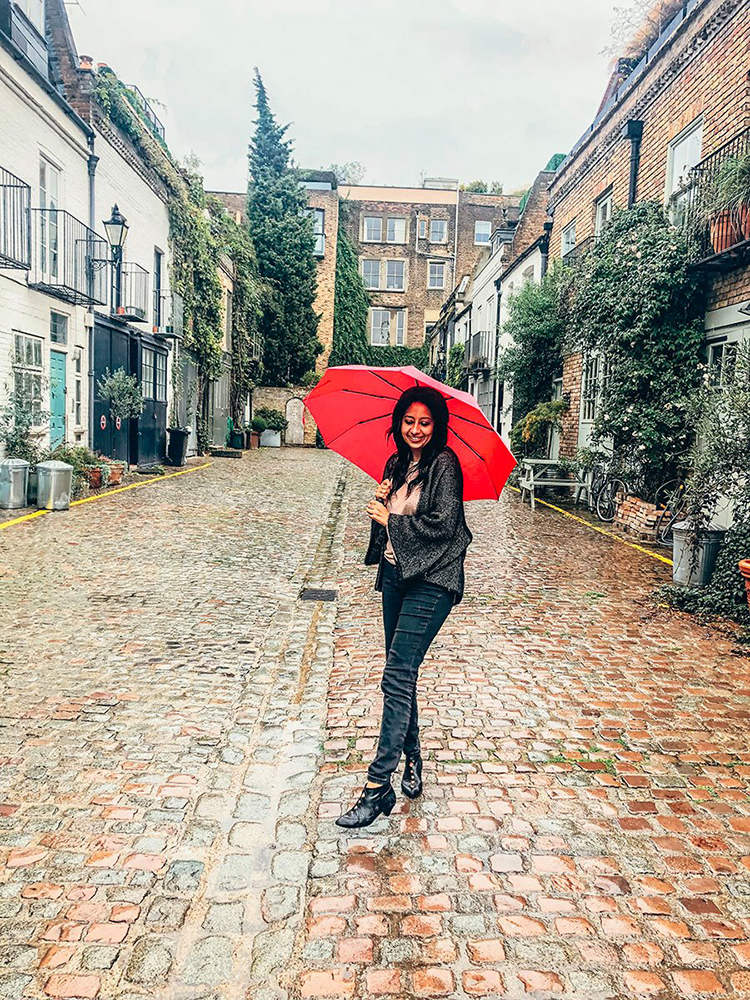
Name: Jackie Rezk
Nationality: U.S.
Current Location: London, U.K.
Website: joujoutravels.com;
Instagram: @joujoutravels; Facebook: joujoutravels
I was in London when the pandemic started and didn’t ever think it could get this big. I work a corporate research job and in March, we were told to start working remotely, which will continue for the rest of the year. I feel thankful that I have a job that will allow me to work remotely, and I didn’t lose work like millions of people. It was a tough transition at first. I live alone and going into work and interacting with friends is a must for me or I will go crazy. So, at the beginning, I felt sad not knowing how long this would go on for and knowing not being close to others was a possibility. Even walking down the street, not seeing a smile from a stranger but instead a complete departure from the sidewalk to avoid you [was depressing.] I moved to London two years ago from the U.S., and I still find it hard to have a close network of friends here, which is important especially during a time like this. But until the pandemic, it was great that I finally grew closer to a friend and her flat mate. We did many video calls on Friday nights to keep each other company and when the regulations loosened a bit, I started to stay with them every weekend. We had so much fun visiting the park, cooking, and chilling. When I moved to London, finding a friend to do nothing with but hang out was really hard.
The lockdown started on March 23rd. All non-essential shops were closed and only a limited amount of people could enter grocery stores at a time. On June 15th, they announced non-essential shops could re-open. On July 4th, they re-opened pubs & restaurants, but there are still limits on how many can enter at a time. There is a mandatory 14-day quarantine for travelers to the UK and it was recently loosened so that you do not have to quarantine from 60 selected countries (it excludes high risk countries such as the U.S.).
As a creative minded person, I make jewelry in my spare time and during the lockdowns, I discovered a new hobby and obsession. I got this amazing colouring book of all my favourite places in London called Pretty City London and started to shade in the places I missed visiting so much. I got coloured pencils and metallic water colours, too! I have an obsession with gold and metallic things! It was fun to pass by the time and a relaxing activity to do.
In the end, positive things came out of this situation, which started out so dreadful. I found new hobbies, developed stronger friendships and learned to be grateful for the small things in life like having a job, a warm cozy bed, and good friends and family. The lockdown in London was much stricter than in the US and things are just now starting to open like restaurants and pubs only as of July 4th.
Future Travel Plans:
Although, I found a way to pass the time during this lockdown, I still itched so badly for the chance to travel again. Travel is a huge passion of mine and the reason I moved to London was so I could have better access to all the beautiful countries surrounding me. I know some may say it’s a bit soon to travel again and there are a lot of haters out there saying, “How could you travel now during all of this?” but I’m ready to take back off and will do so with safety precautions in mind. I am heading to Italy right now for a month and will work remotely for half of the time there since I am already doing so in London. I’m planning to fly into Bari, Italy and explore in depth the area of Puglia and Matera. I will rent a car to avoid public transport as much as possible and see all the hidden corners in the boot of Italy – something I’ve dreamed of doing. The South of Italy did not get hit as hard with the virus and remains open for visitors from the U.K. and EU without quarantine on arrival. I cannot wait to explore the world again, give Italy some love since it’s tourism has been hurt so much, and have the chance to stay longer than normal with my ability to work remotely. If you love travel as much as me, my advice is to not let fear take over you. Travel has opened me up so much from making me a stronger person by experiencing different cultures, meeting new locals, and most importantly having the courage to travel alone. If I didn’t have this courage, I would end up being at home maybe on the couch and not seeing the rest of the world.
Bali, Indonesia:
Surfing & Feeling Safe in Indonesia
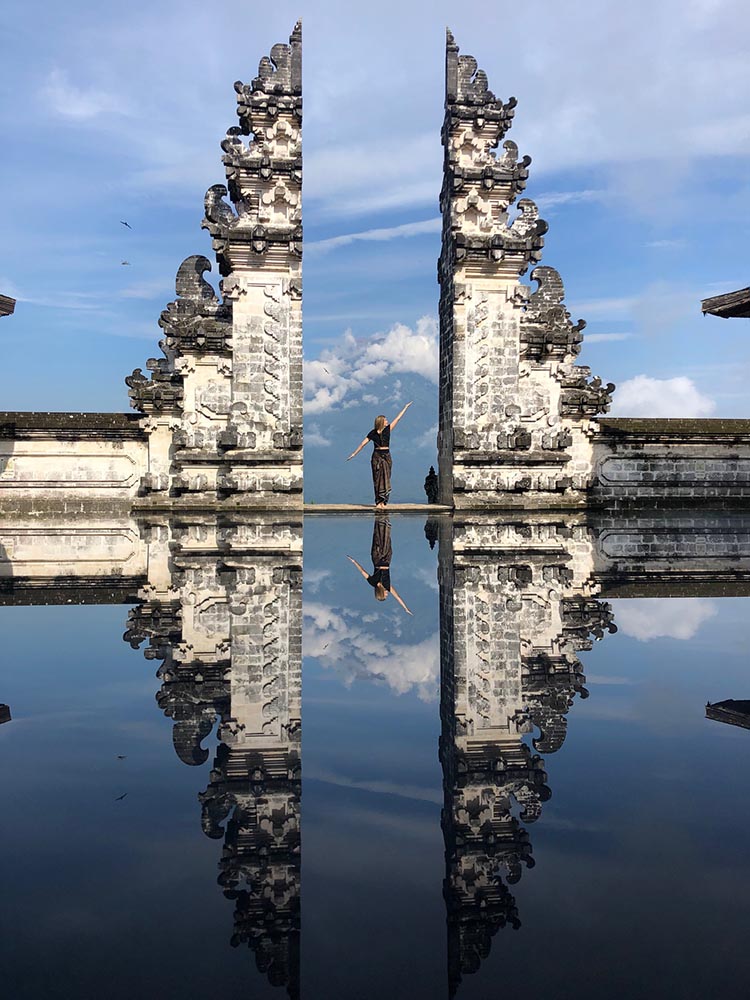
Name: Ashley Clawson
Nationality: U.S.
Current Location: Bali, Indonesia
Instagram: @bearnomadic
In February, I had travel plans to fly from Austin to Denpasar (Indonesia), routing through mainland China. Due to flight cancellations by both Xiamen and American Airlines, it took a total of three re-booked international flights for me to make it from the United States to Indonesia. During my time in Austin-Bergstrom, Hong Kong, and Denpasar International Airports, I remember very few people wearing masks.
In March, the first COVID-19 “government shutdown” occurred in Bali on the day after Nyepi and lasted just 24 hours. (Nyepi is a Balinese cultural tradition that requires all Balinese and foreigners to remain indoors for a day.) I initially thought the post-Nyepi 24-hour shutdown was some sort of extension of Nyepi. When I tried to leave my hotel, I was asked by some random government officials roaming the streets to stay inside. Bali just sort of works like that. You figure things out as you go. In fact, many of us receive news via word of mouth and social media.
From what I’ve directly observed over the past several months since the first 24-hour shutdown, some people wear masks, but most don’t; some large businesses are closed or impose “take away only” restrictions, but virtually all local warungs and small shops remain open; some major tourist attractions are open, and some aren’t. Because the primary source of income of the Balinese people is almost entirely dependent upon tourism, and a mass amount of the tourists departed during the initial COVID-19 panic, many Balinese people are struggling to survive.
From the information I’ve received, the Balinese people aren’t receiving “stimulus checks,” loans, or government handouts. Fortunately, several groups of foreigners have conducted relief efforts, gathering and donating food supplies to the Balinese communities who are most desperately in need. I’m honestly amazed at how the Balinese people are able to live off of such limited resources, and how their community-based culture keeps them alive. Not once have I seen any grocery stores or markets ransacked or depleted of supplies.
The foreigners who have remained in Bali, including myself, have been “stuck” here for months. Many of my friends who have attempted to return to their home countries had their flights cancelled by the airlines, some receiving airline vouchers in lieu of monetary refunds. As government restrictions in Bali continue to lift, we spend most of our days surfing, snorkeling, diving, and hiking. Luckily, Bali has maintained a severely low COVID-19-related morbidity rate resulting in death, comparatively, to other parts of Indonesia, and to other parts of the world.
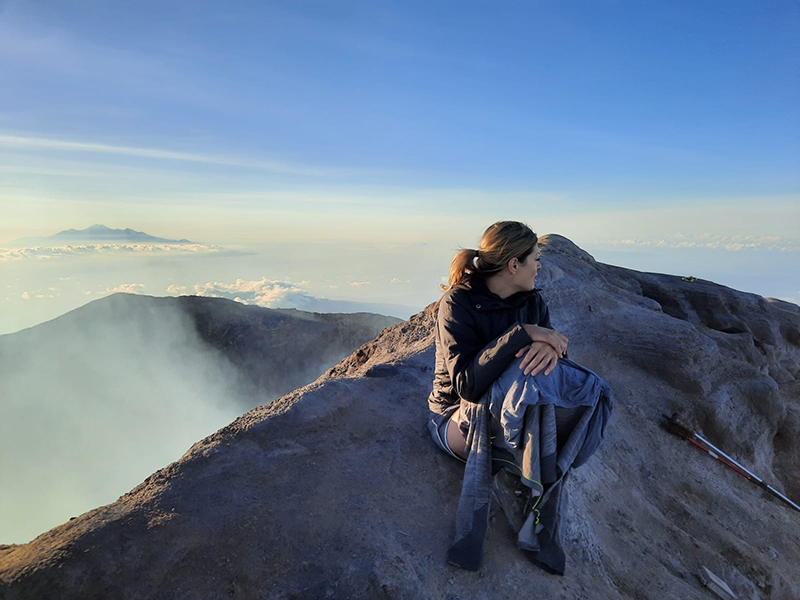
Future Travel Plans:
My initial plan was to spend a couple of months in Bali, a month in Melbourne, a month in Sydney, and then who knows where after that. However, in February, when Australia closed borders, and my Airbnb accommodations in both Melbourne and Sydney were cancelled, I decided to make Bali my home for the foreseeable future. As of now, all foreigners who have remained in Bali have been granted emergency Indonesian visas for an undetermined period of time. When our emergency visas expire, maybe we’ll do visa runs in Singapore, or maybe we’ll move to other countries, but very few of us actually talk about returning home.
It’s incredible how powerful your own perspective is in determining whether you’re a victim of circumstance or to transform your experience into an opportunity to learn about your environment and yourself. I’ve found that long-term travel is filled with bursts of ambiguity, self-discovery, and straight up magic. I feel incredibly safe in Bali, and so lucky to be here during this time.
[I interviewed Ashley previously about her solo hiking trip through all of the national parks in the continental U.S. Check out the post here!]
Stay safe and well! And, please wear a mask! 🙂

